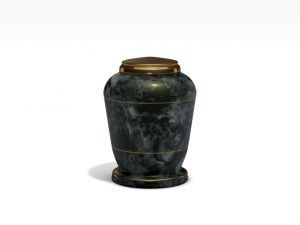
More and more people are choosing cremation
funeral urn on white background
The Cremation Association of North America has noticed an interesting trend. In the past 15 years, the cremation rate has doubled, most clearly represented by a large concentration of people in the northeast and western regions of the country. Coincidentally, or maybe not, the same regions report an increase in the number of people who do not subscribe to an established church or organized faith. Although some of the data seems to clearly overlap, changes in how people are choosing to memorialize their loved ones are driven by more than coincidence.
Regional Variations
In 2014, Nevada led the upward trend in cremations at 75.9 percent, followed by Washington, Oregon, Hawaii, and Maine, all between 71.2 and 75.2 percent. In these states, people are more likely to state that they follow an individual spiritual path rather than the doctrine of a specific religious organization. Far fewer people choose to be cremated in Mississippi, where only 19.7 percent of the population is cremated. Other statistics included:
- Alabama: 22.9 percent
- Kentucky: 24.6 percent
- Louisiana: 27.6 percent
- Utah: 29.7 percent
People who live in these regions were far more likely to associate themselves with a specific church. In these areas of the country, traditional funerals and internments are still the primary choice for memorial services.
Numbers Are Up Overall
Despite the regional differences, however, cremation in general is far more accepted than it was just a decade and a half ago in the United States. CANA research states that 46.7 percent of Americans opted for cremation in 2014, compared to 24.8 percent in 1999. Speculation about the overlap between cremation and individualized spirituality are fueled by a 2015 Pew Research Study that addresses the increased population of people in the United States who do not affiliate with any particular religion.
Of course, these findings are not conclusive. When the Catholic church altered its stance on prohibiting cremation, many faithful Catholics chose that path over a traditional burial. There are financial considerations as well. For a large number of people of all faiths, and of no particular faith, cremation is a more affordable option. Cremation in the United States typically costs between $700 and $1,200, while a burial with a casket may cost between $7,000 and $10,000.
Open to Individuality
Another driving factor in the rise in popularity of cremation is flexibility. Many people appreciate the ability to schedule a memorial for their loved one when distant friends and family may attend. There is also time to organize whatever special plans the loved one had for his or her own memorial. Travel is more easily arranged with ashes rather than a casket. Some people even opt to hold a celebration of life on the anniversary of the person's death, with the ashes as a prominent aspect of the memorial.
Other, sometimes elaborate, memorials involve using the loved one's ashes as part of a greater project, such as building a saltwater reef. There are multiple services that will send one's ashes into space or create a precious gem from the cremains.
Changing Environment
Some environmentalists might argue that, as an earth friendly memorial, cremation still leaves a substantial carbon footprint. It is, however, considered by many to be a greener option than traditional internment. Cremation avoids the wood finishes and hardware of a casket as well as the formaldehyde used to preserve people for wakes and services. Also, cremation skirts issues such as sustainable sourcing and the dearth of viable cemetery space.
Multiple Cultural Shifts
While CANA and other research resources may draw a tentative line from the popularity of cremation service and the waning of traditional religious affiliation, there are other forces at play. Affordability, flexibility, and the opportunity to construct a personalized experience are all reasonable factors in the shift away from the burials of yesterday.
Add Your Comment